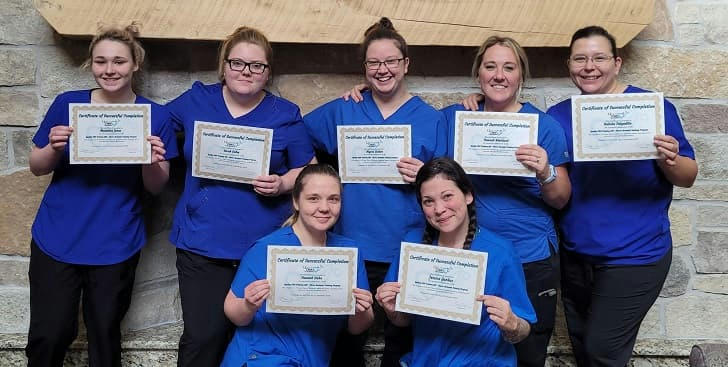Essential Skills for CNAs: Building the Foundation for a Successful Career
Certified Nurse Assistants (CNAs) play a pivotal role in healthcare by providing direct patient care and serving as the backbone of support for nurses and doctors. Their work requires a combination of technical skills, emotional intelligence, and physical stamina. Developing these skills is crucial for anyone aspiring to succeed in this challenging yet rewarding field.

Technical Skills Required for CNAs
A CNA’s technical skill set includes various practical abilities that ensure the safety and comfort of patients. Some of the most critical skills are:
Vital Signs Monitoring: CNAs must accurately measure and record patients' blood pressure, heart rate, temperature, and respiratory rate. These metrics help healthcare teams track a patient’s condition and detect early signs of complications.
Basic Nursing Care: Tasks such as assisting with bathing, dressing, and grooming ensure patients maintain their dignity and hygiene.
Mobility Assistance: Helping patients move safely, whether transferring them from a bed to a wheelchair or assisting with physical therapy exercises, is an essential part of a CNA's duties.
Emergency Response: In critical situations, CNAs need to stay calm and act swiftly. Their training includes CPR, basic first aid, and emergency procedures to handle life-threatening scenarios effectively.
Infection Control: Preventing the spread of infections is a top priority in healthcare. CNAs learn proper handwashing techniques, sterilization processes, and the correct use of personal protective equipment (PPE).

Soft Skills: The Heart of a CNA’s Role
While technical skills are crucial, soft skills are equally important for CNAs, as their role involves constant interaction with patients, families, and healthcare teams. Key soft skills include:
Empathy and Compassion: Many patients are in vulnerable situations, and CNAs must provide care with kindness and understanding to help them feel supported.
Communication: CNAs act as a bridge between patients and medical staff, conveying critical information about patient conditions. Clear and concise communication is vital.
Patience: Working with patients, especially those with chronic illnesses or disabilities, requires patience and the ability to handle challenging situations calmly.
Attention to Detail: CNAs must be vigilant about changes in patients’ conditions, as small details can indicate significant health issues.
Physical Endurance: The job often involves standing for long hours, lifting patients, and handling physically demanding tasks, making physical fitness a necessity.

How CNA Training Develops These Skills
CNA training programs are designed to equip students with the essential skills needed for the role. The curriculum typically includes:
Classroom Learning: Students learn the theoretical aspects of patient care, including anatomy, medical terminology, and ethics.
Practical Training: Hands-on experience in clinical settings allows students to apply their knowledge under the supervision of experienced professionals.
Simulated Scenarios: Training programs often include simulated emergencies to teach students how to respond effectively under pressure.
Tips for Aspiring CNAs
Seek Internships: Gaining experience in a healthcare setting during training can provide valuable insights and improve your confidence.
Focus on Communication: Practice active listening and empathy to enhance your interactions with patients and colleagues.
Stay Physically Fit: Regular exercise can help build the stamina needed for physically demanding tasks.
Continuously Learn: Healthcare is a rapidly evolving field. Staying updated with the latest practices ensures you provide the best care possible.

A Career Built on Skills and Compassion
Case 1: From Home Caregiver to CNA in a Hospital Surgical Department
Background:
Karen, a 45-year-old home caregiver, had been providing informal caregiving services to neighbors. Her income was low, and she lacked job security. She wanted to pursue a more stable and professional career.
Turning Point:
Karen enrolled in a 12-week CNA training program, learning patient care, first aid, and infection control skills. She successfully passed the certification exam and gained hands-on experience during her internship.
Outcome:
Karen was hired at a hospital in the surgical care department. Her hourly wage increased from $10 to $22, and she received additional benefits. With continued education, Karen plans to transition to becoming a surgical technologist to further advance her career.
Case 2: From No Experience to Mental Health Care Specialist
Background:
Michael, a 30-year-old unemployed young man, had only worked temporary jobs. He was interested in the field of mental health but didn't know how to get started due to lack of experience and resources.
Turning Point:
Michael enrolled in a CNA training course with a focus on mental health care. The course emphasized communication skills and how to support patients with mental health challenges. After completing the training, he secured a job at a mental health rehabilitation center.
Outcome:
Michael started with an hourly wage of $20, but his skills quickly set him apart. He was promoted to team leader, responsible for training new employees and managing patient care plans. His annual income grew to over $45,000, and he plans to pursue further studies in mental health nursing.
Case 3: From Odd Jobs to CNA in Maternal and Infant Care
Background:
Sophia, a young mother, had to rely on temporary jobs to support her family. She was interested in maternal and infant health and wanted to find a career in this field.
Turning Point:
Sophia enrolled in a CNA training program that specialized in maternal and infant care, where she learned about newborn care, breastfeeding support, and postnatal care. After completing the course, she was hired by a local maternity hospital.
Outcome:
Sophia's starting hourly wage was $24, with flexible working hours that allowed her to balance work and family life. Her passion for maternal and infant care earned her trust from patients and colleagues, and she plans to pursue a midwifery program to further her career.
Being a CNA is a profession that demands a unique blend of technical expertise and heartfelt care. Developing these skills not only prepares you for success but also allows you to make a meaningful impact in the lives of others. For those willing to embrace the challenges and rewards of the role, the CNA profession offers a fulfilling and impactful career path.
